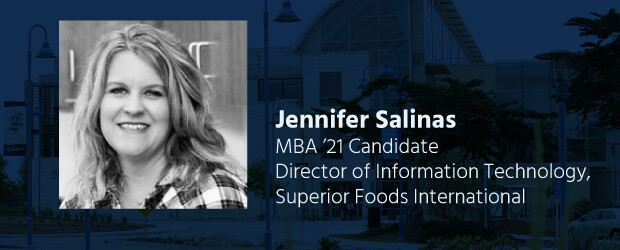Jennifer Salinas, MBA ’21 Candidate Director of Information Technology, Superior Foods International
Superior Foods International (SFI) is a global supplier of fruits, vegetables and grains with offices in the US, Europe, China, and South America, and a supply base across 25 countries.1 The company not only exists to earn profits for its owners, but also strives for a higher purpose, as stated in the following CSR statement: “We are acutely aware of our social and environmental impact. One element of our corporate strategy is to maximize value by operating with the highest standards of integrity in our business dealings, activities and corporate governance.”2
One of many business practices that illustrates Superior Foods' commitment to being a ‘global steward’ is that of connecting small farmers, of which 40% are women, in remote areas such as the highland area in Guatemala, to modern markets and global supply.2 SFI has accomplished this by investing time and money into the initiative and by joining other partners such as the Sustainable Food Lab, Oxfam and Target to form the Guatemala Highland Value Chain Development Alliance. This Alliance relies on a group of experts to provide education and technical assistance in areas such as sustainable agriculture, poverty alleviation and agribusiness to small, rural farmers in the region of Sololá, Guatemala, in order to improve their farm operations and increase sale opportunities for their produce globally.3
Superior Foods International, being in the frozen produce business, has gained a steadier supply of quality produce through this partnership, but the benefits go far beyond corporate profits. The farmers in Guatemala learn valuable skills to help them run their small businesses successfully and they get the opportunity to discuss and learn technical and sustainable farming practices that they would not normally be exposed to. These skills enable them to meet the quality standards and private sector demands, and increase crop yields, which has allowed them to make more money to support their families and support the economic growth of the region in which they live. It is a win-win situation for all involved and an example of Shared Value Creation.5
Marco Cruz, CEO and President of Superior Foods International, concluded, "Most companies would shy away from working with smallholders because of the challenges, but we have shown that it is possible and it can be done successfully."4
Become a responsible business leader
In the CSUMB Responsible Business Online MBA program, you’ll expand your skills and expertise with the professional business competencies valued by employers in today's global marketplace. Review our curriculum and schedule an appointment with one of our Admissions Advisors today.
- Retrieved on March 16, 2021 from superiorfoods.com/company
- Retrieved on March 16, 2021 from. superiorfoods.com/social-responsibility
- Retrieved on March 16, 2021 from sustainablefoodlab.org/initiatives/guatemala-highlands-alliance/
- Retrieved on March 16, 2021 from seasofchange.net/marco-cruz-superior-foods-international-3/
- Porter, M. E., and Kramer, M. R. Creating Shared Value. Cambridge: Harvard Business Review, January-February, 2011.

